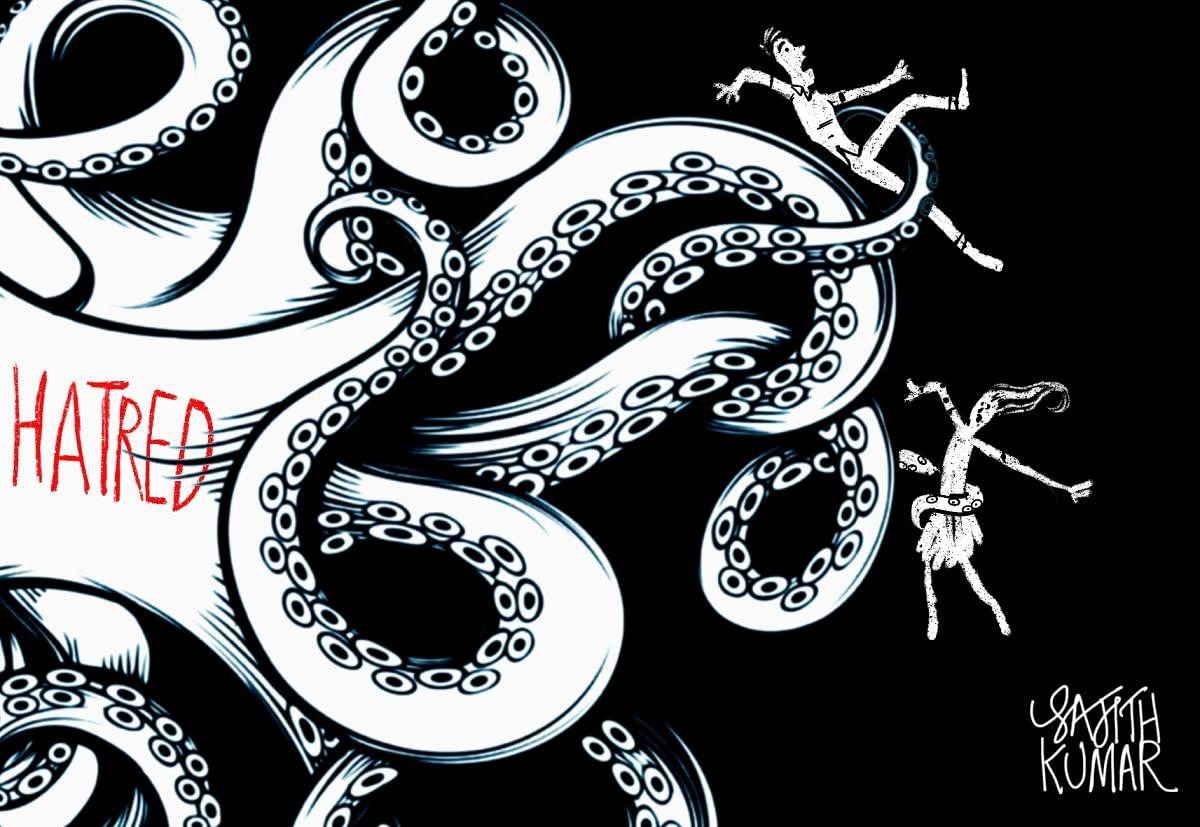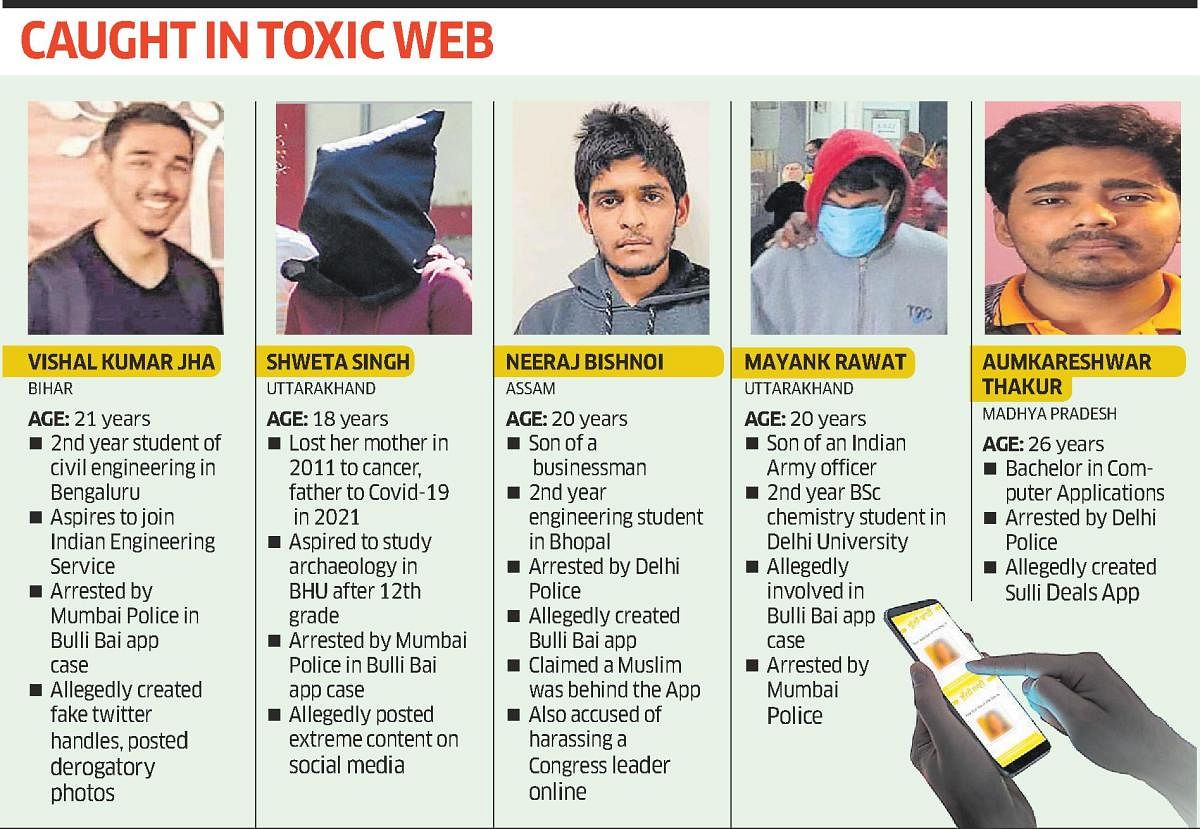

When the sun rose with new hopes and aspirations on the New Year, around 100 Muslim women – journalists, activists, actresses, politicians, a Radio Jockey, a pilot and an elderly mother of a missing Jawaharlal Nehru University student among others – woke up to a rude shock. Their doctored pictures were up on an App, ready to be auctioned. It was deja vu for many, as they recalled a similar demeaning online auctioning six months ago.
Those who built the derogatory apps were all young, educated and obviously tech-savvy.
Last year, cricketer Mohammed Shami faced a barrage of trolls over his religion after India lost to Pakistan in a T-20 World Cup match. Shami’s captain Virat Kohli too bore the brunt for supporting India’s pace spearhead, as a Hyderabad-based young engineer allegedly issued a rape threat to his daughter on Twitter.
Bengaluru South MP Tejasvi Surya once obliquely referred to Muslims as 'puncturewalas’; 16 Muslim workers were suspended in May, last year, after he targeted them out of the 206 total employees serving in a Covid centre. While suspended staff were reinstated, five of them refused to return. Going a little further in the past, Anurag Thakur, now a cabinet minister, had exhorted a Delhi crowd to chant ‘Desh ke Gaddaron Ko, Goli Maaro Saalon Ko’ (Shoot the Traitors) during an election meeting in 2020. West Delhi MP Parvesh Verma had claimed that anti-CAA Shaheen Bagh protesters would enter Delhi homes and rape people. Surya, Thakur, and Verma are the young, rising faces of the BJP.
Remember, a young photographer Bijoy Bonia accompanying a police team stomping on a protester, who was shot in the chest? Recall, a young IAS officer Ayush Sinha asking security personnel to break the heads of protesting farmers?
Take the cases of the ‘'Sulli Deals'’ and ‘'Bulli Bai'’ apps, where articulate Muslim women were targeted. Five educated youngsters have been arrested – a BCA degree holder Aumkareshwar Thakur (26), engineering students Vishal Kumar Jha (21) and Neeraj Bishnoi (20), BSc chemistry student Mayank Rawat (21) and Shweta Singh (18), who wanted to study in Banaras Hindu University after passing the 12th-grade exam. A Telegram channel posting derogatory posts of Hindu women subsequently came to surface. Only last week, a section of students forced authorities in a college in Chikkamagaluru to ensure that Muslim students sit in classes only after removing their headscarves. The list is long.
What has happened to the educated youth in India? Why do they keep so much hatred and misogyny in their hearts?
Climate of impunity
Satish Deshpande, eminent sociologist and Delhi University professor, attributes it to the existing “climate of impunity”. He says there were such instances earlier too “but the reason why they are happening so often now is because of the climate of acceptance that is created, even encouraged”. He says particular groups are targeted because of the existing political climate. “It is the culmination of decades of hate politics. This generation has grown on deceit and lies spread about minorities, especially Muslims. They also know that there is state patronage for hate-mongers, so it has emboldened them,” says activist Shabnam Hashmi.
The democratic discourse has now turned into a TV reality show where toxic masculinity makes you the winner. The aggression of news anchors on prime time TV may have more takers at a time when lynching and hate speech have become a national sport. One of those arrested in the 'Bulli Bai' app case was said to be a watcher of a particular channel’s prime time show. Those involved were also part of ‘trad’ (traditionalists who have extreme right-wing views) online groups.
What does happen when political rhetoric erases boundaries of democratic discourse? Investigators claim that one of the arrested in the 'Bulli Bai' app case, Vishal Kumar Jha, deliberately created handles under assumed Sikh names. One of them was Khalsa Supremacist. Jha might have thought the political rhetoric against Punjab’s farmers, who were called Khalistanis during the protest against now-repealed farm laws, could be used to help cover tracks. Neeraj Bishnoi, another arrested, even allegedly tried to mislead investigators by claiming that a Muslim was behind the App. Teenager Shweta Singh was said to be posting communal content.
“We had seen similar sentiments during the anti-quota agitation. It was on caste lines, now it has taken a communal angle. What happened to the case of a protest at Jantar Mantar where there were open calls to kill people of a particular community? They are feeling empowered. We had seen them being welcomed with garlands. The government’s silence has a huge role,” Annie Raja, general secretary of the National Federation of Indian Women, says.
Activists believe that if there was prompt action in the 'Sulli Deals' case, there wouldn’t have been the 'Bulli Bai' app. Delhi Police appeared to have woken up and arrested the alleged mastermind in the 'Sulli Deals' app case, which it registered six months ago, only after Mumbai Police caught some in the 'Bulli Bai' case. Competition among the forces appeared to have some impact! It is time now to unravel the larger conspiracy in these cases.
The reasons for the rage could be due to many seeing the digital reality as ultimate reality. Dr Rajat Mitra, a well-known Delhi-based psychologist, says this digital takeover has an impact on brains. “Brain is now being forced to deal with reality in a different way and it results in enormous stress. Many neuropsychologists are pointing that out,” he says, citing the example of the two students telling him that they don’t feel the need to visit Rome as they have digitally visited the city.
Dr Mitra also points to the Covid-19 pandemic, which has “destroyed” dreams of new avenues. “It is time for children and young people to expand their space, to define their identity, go out and explore. That is missing. The bond many had, has broken. It is no longer physical proximity that defines bonding. It is only a voice. Detachment has set in,” he says. Bishnoi, one of the arrested in 'Bulli Bai' case, could attend his engineering classes only on online mode, thanks to the pandemic.
One will have to live with an enlarging digital space in one’s lives. But the question one will have to answer will be whether to be a slave to online echo chambers.
Check out the latest DH videos here:
